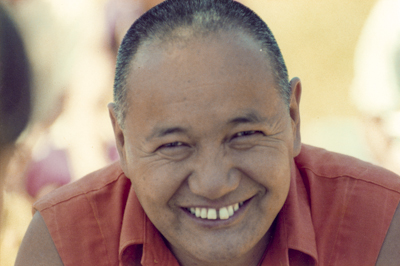
We often find that people fear those from different countries or religions; they’re suspicious, insecure: “I’m not sure about him.”
This happens because we don’t understand each other. If we really understood and communicated with each other, our fears would disappear. Our understanding of what other religions teach and how they affect human development is limited—therefore, we feel insecure when interacting with their followers.
We don’t think anything of a big restaurant having an extensive menu. Different people like different kinds of food in order to enjoy their lives and feel satisfied. It’s the same thing with religion. Different paths are necessary for different people’s minds. If you understand this, you won’t feel uncomfortable with practitioners of other religions; you’ll accept them as they are.
Our problem is that we don’t accept ourselves as we are and we don’t accept others as they are. We want things to be other than they are because we don’t understand the nature of reality. Our superficial view, fixed ideas and wrong conceptions prevent us from seeing the reality of what we are and how we exist.
Through meditation, you can discover how even actions of body and speech are uncontrollably psychologically motivated. This discovery leads you to natural control of all your actions.
An understanding of your psychological impulses is all you need to become your own psychologist. Then you don’t need to run to others like a baby, “Am I all right? Do you think I’m okay?” It’s babyish to always be asking somebody else if you’re okay. It makes your whole life baby-like and you always feel insecure. Having to rely on somebody else to tell you you’re okay only makes your life more difficult. Anyway, half the time you’re not going to believe what the other person says, so why bother? It all becomes a ridiculous joke.
You should know every aspect your own life. Your life will be more integrated and you’ll see things more clearly. A partial view of life can only make you insecure.
There are many types of psychological impulse driving us to do what we do. Some of these are positive, others negative. Instead of simply doing whatever our impulses dictate, it’s better to step back and ask, “Why?”
For example, when you have a headache, instead of asking yourself, “What is this headache?” ask, “Why do I have a headache? Where has it come from?” Investigating the source of the headache is more interesting than simply trying to find out what it is. Sometimes just understanding its source can make it go away. Just wondering what it is can never lead to understanding. All you see is the superficial feeling, not its background or deep root.
Sometimes people think, “I’m getting older every day. How is it possible to develop the mind?” If you think that your mind ages and degenerates the way your body does, you’re wrong. The way the mind and body function and develop is different.
 Meditation isn’t necessarily some kind of holy activity; when you meditate, you don’t have to imagine holy things up there in the sky.
Meditation isn’t necessarily some kind of holy activity; when you meditate, you don’t have to imagine holy things up there in the sky.
Simply examining your life from the time you were born up till now—looking at the kind of trip you’ve been on and what sort of psychological impulses have been propelling you—is meditation.
Observing your mind is much more interesting than watching TV.
Once you’ve seen your mind, you’ll find television boring. Checking in detail what you’ve been doing from the time you were born—not so much your physical actions but the psychological impulses driving you to do them—is extremely interesting and is how to become familiar with the way your internal world functions.
Analyzing your own mind with your own knowledge-wisdom makes you mentally healthy. It’s how you discover that your enjoyment does not depend on chocolate; you can be happy and satisfied without chocolate. Normally you tend to believe, “As long as I have chocolate, I’ll be happy. I can’t be happy without it.”
You make your own philosophy of life with this kind of determination, which comes from attachment. Then, when the chocolate disappears, you get nervous: “Oh, now I’m unhappy.”
But it’s not the absence of chocolate that’s making you unhappy; it’s your fixed ideas. It’s the way your mind tricks you into believing that your happiness depends on external objects. It’s your psychological impulses that make you mentally ill. People get homesick, don’t they? Well, here’s a new type of illness: choc-sick. I hope you get what I’m saying.

Of course, this is just one example of how our mind gets fixed ideas. In our lifetime, we fixate on thousands of ideas in this way: “If I have this, I’ll be happy; if I have that, I’ll be happy. I can’t be happy if I don’t have this; I can’t be happy if I don’t have that.” We fixate on this, we fixate on that, but life is constantly changing, running like an automatic watch. You can see impermanence simply through observation.
Fixed ideas shake us; they make our mind uncomfortable, agitated and split. According to Lord Buddha, putting strong faith in material objects, thinking, “only this will make me happy,” is a total fantasy.
When you understand your relationship with chocolate, you know it’s impermanent. Chocolate comes; chocolate goes; chocolate disappears. That’s natural. When you understand it’s natural, you have no fear. Otherwise, your clinging to chocolate is a rejection of the natural order. How can you reject the world? “I want to remain 16 forever.”
No matter how much you wish for things to stay the same, you’re asking the impossible. It’s a complete misconception. From the Buddhist point of view, you’re dreaming. Irrespective of whether you have faith in religion or reject it, you’re dreaming.
If you have the psychological tendency to reify ideas, you’re a believer. Even though you say, proudly, “I’m a skeptic; I don’t believe anything,” it’s not true. Check up: you’re a believer. Just two or three questions will prove that. Do you think some things are good? Do you think some things are bad? Of course you do. Those are beliefs. Otherwise, what is belief?
A belief is something we create with our own logic— irrespective of whether it’s right or wrong. Everybody has some reason for thinking, “This is good; that is bad.” Even if it’s completely illogical, it’s reason enough for some people to conclude, “Wow! I like that.” Because of this, they think, “Yes.” That’s the fixed idea; that’s the belief.
I’m not just being cynical. This is my own experience. I have met many skeptical Westerners and checked. Intellectually, they say, “I don’t believe anything,” but ask them a couple of questions and you’ll immediately expose many beliefs within them. This is living experience, not some abstract philosophy.

However, the function of meditation is to reintegrate the split mind; to make the fragmented mind whole. Meditation brings satisfaction to the dissatisfied mind and explodes the idea, or belief, that happiness depends on circumstances alone.
It is important to know this. Weak people can’t face problems. Meditation is a way of helping you become strong enough to face your problems instead of running away from them. It allows you to face and deal with your problems skillfully.
* Read more from Lama Yeshe’s The Peaceful Stillness of the Silent Mind, a series of lectures given in Australia in 1975. Edited by Nicholas Ribush. Freely available from the Lama Yeshe Wisdom Archive.
Relephant read:
Your Thoughts Do Not Create Your Reality, Stupid.
Love elephant and want to go steady?
Sign up for our (curated) daily and weekly newsletters!
Author: Lama Thubten Yeshe
Editor: Catherine Monkman
Photos: Author’s Own






Read 0 comments and reply